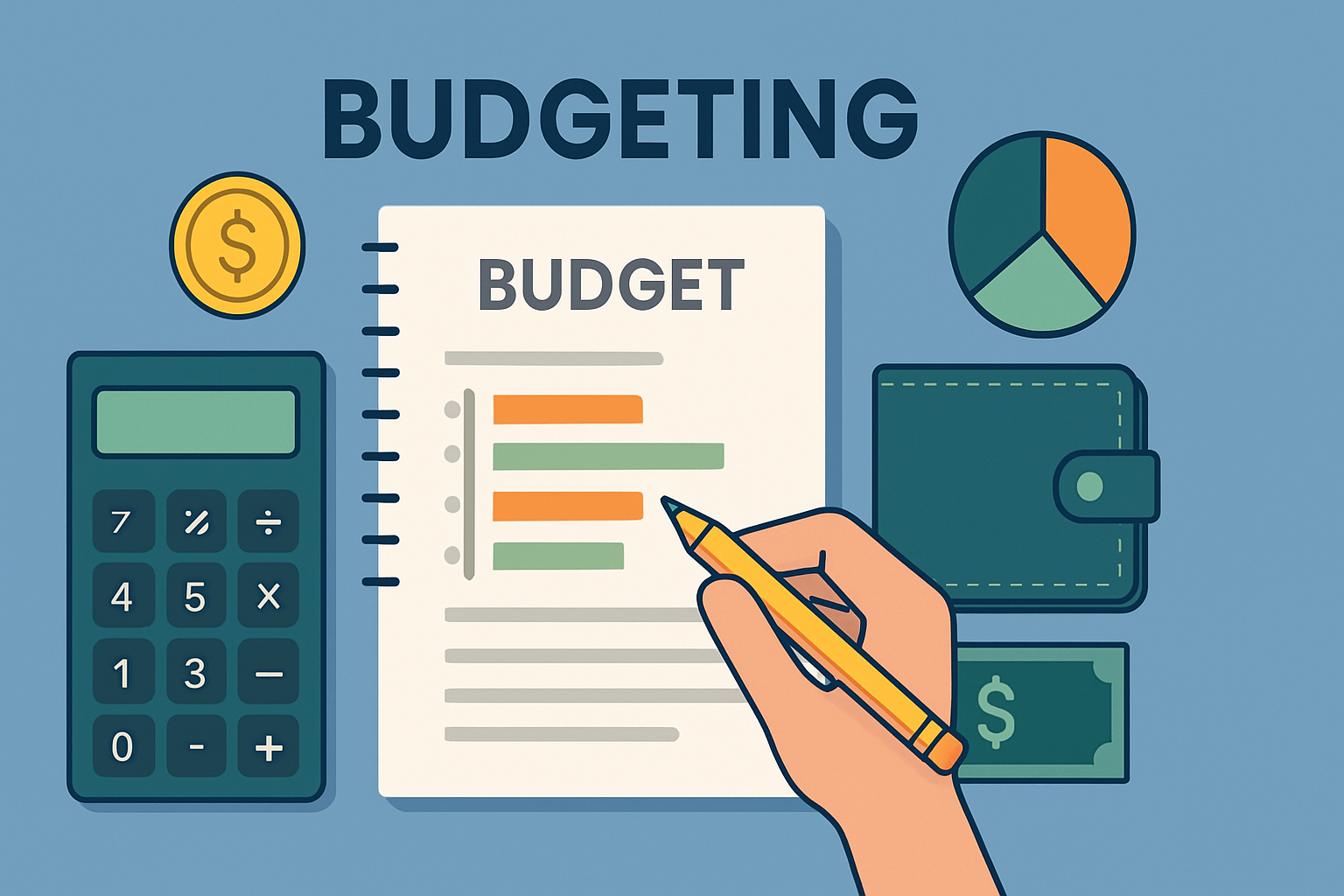Introduction
In today’s economy, where inflation, rising costs, and income uncertainty dominate headlines, managing personal finances is no longer optional—it’s essential. Among the many tools available for financial success, budgeting remains the foundation of effective money management. Whether you are living paycheck to paycheck, saving for your first home, or planning for retirement, building and maintaining a personal budget gives you clarity and control over your financial life.
Budgeting is more than just tracking expenses. It’s about making intentional decisions that align your spending with your values and goals. In this guide, we’ll explore what budgeting is, why it’s critical in 2025, how to build a personalized budget from scratch, and how to sustain it long term even in a fluctuating economy.
Understanding What Budgeting Really Means?
Budgeting is often misunderstood as a restrictive or punitive practice that limits enjoyment. In reality, a budget is simply a financial plan. It helps you understand your income and expenses so you can allocate your money effectively. Think of it as a strategy for telling your money where to go instead of wondering where it went.
In 2025, the average consumer faces numerous financial pressures—from rising rent and utility costs to growing debt and inconsistent job markets. Without a budget, it’s easy to spend impulsively, fall into debt, or miss out on saving opportunities. Budgeting puts you back in the driver’s seat of your financial journey.
Step-By-Step Guide To Building A Personal Budget
Creating a personal budget may seem overwhelming at first, but when broken down into manageable steps, it becomes a powerful exercise in financial self-awareness and planning.
The first step is to calculate your total monthly income. This includes your salary, freelance work, rental income, dividends, and any other regular sources of earnings. Use your net income—what you take home after taxes—as the base for your budget. This gives you a clear and realistic figure to work with.
Next, track your expenses. This means accounting for every dollar you spend. Start by listing your fixed costs, such as rent, loan payments, insurance, and subscriptions. Then, examine your variable expenses—these include groceries, transportation, entertainment, and dining out. You may need to track your spending over a month to get a complete picture of where your money goes.
Once you know your income and expenses, categorize them. Common categories include housing, utilities, transportation, food, health care, debt repayment, savings, and discretionary spending. The key is to be as specific as possible. A detailed breakdown helps you identify spending patterns and areas for improvement.
After categorizing, compare your income to your total expenses. If your expenses exceed your income, you’ll need to make adjustments. This may involve cutting back on discretionary items, finding ways to reduce fixed costs, or increasing your income. If you have a surplus, decide how to allocate it wisely—whether toward savings, investments, or debt reduction.
The final part of building your budget is choosing a budgeting method that suits your lifestyle. Some people prefer the zero-based budget, where every dollar is assigned a job. Others may use the 50/30/20 rule, allocating 50 percent of income to needs, 30 percent to wants, and 20 percent to savings or debt. There’s no one-size-fits-all method. What matters is consistency and alignment with your financial goals.
Maintaining And Adjusting Your Budget Over Time
Creating a budget is only half the journey. Maintaining it requires discipline, regular reviews, and a willingness to adapt. Life is unpredictable, and your budget needs to be flexible enough to accommodate changes in income, expenses, and goals.
Set a routine to review your budget at least once a month. During these reviews, compare your actual spending to your planned budget. Look for any categories where you overspent or underspent, and make necessary adjustments. These reviews help you stay accountable and spot financial leaks early.
Budgeting apps and tools can simplify this process. In 2025, there are countless digital platforms—like YNAB, Mint, and PocketGuard—that link directly to your bank accounts, categorize transactions automatically, and provide real-time insights into your spending habits. While you can budget with a spreadsheet or notebook, technology can make the process more efficient and engaging.
Don’t be discouraged by occasional setbacks. Everyone overspends or deviates from their plan at times. The key is to refocus and revise rather than abandon the process. Over time, budgeting becomes a habit, not a chore. The peace of mind that comes from knowing your financial situation is worth the effort.
The Psychological Side Of Budgeting
Budgeting is not just a financial activity—it’s also a mental and emotional one. Our relationship with money is often influenced by habits, beliefs, and even childhood experiences. Understanding these psychological factors can improve how we approach budgeting.
One common challenge is impulse spending. The convenience of online shopping and digital payments can lead to unplanned purchases that disrupt your budget. Setting up intentional barriers—like a 24-hour waiting rule or leaving items in your cart—can help curb impulsive behavior.
Another issue is lifestyle inflation. As income increases, it’s tempting to upgrade your lifestyle—bigger apartments, new gadgets, or luxury vacations. While enjoying your success is important, unchecked lifestyle inflation can erode the benefits of higher income and reduce long-term financial security.
Budgeting also brings emotional benefits. It reduces financial stress, improves decision-making, and builds confidence. When you’re in control of your money, you feel more secure and empowered in other areas of life as well.
How Budgeting Helps Achieve Long-Term Financial Goals?
One of the most powerful aspects of budgeting is how it aligns your daily choices with long-term goals. Whether you’re aiming to buy a house, start a business, travel the world, or retire early, your budget is the roadmap that gets you there.
When you allocate part of your income to specific goals—like an emergency fund, a down payment, or investment contributions—you turn dreams into actionable plans. This kind of financial clarity allows you to make smarter trade-offs. Skipping a night out or delaying a big purchase becomes easier when you know it brings you closer to something more meaningful.
Budgeting also supports wealth-building strategies. By tracking your spending and identifying surplus funds, you can redirect money into high-yield savings accounts, index funds, or other investment vehicles. Over time, consistent contributions and compound interest can significantly grow your net worth.
If you have debt, budgeting helps you create a structured payoff plan. You can prioritize high-interest debts, consolidate payments, or increase your payments when you have extra income. Having a plan keeps you focused and accelerates your journey to financial freedom.
Common Budgeting Mistakes And How To Avoid Them?
Even with the best intentions, it’s easy to make budgeting mistakes. One of the most common is underestimating irregular expenses. These are costs that don’t occur monthly—like annual insurance premiums, car repairs, or holiday spending. Failing to account for them can cause unexpected shortfalls.
Another mistake is being too rigid. A budget should guide you, not punish you. If your plan is too strict, it can feel unsustainable. Build in some flexibility and leave room for the occasional splurge. This keeps you motivated and reduces the risk of burnout.
Some people make the error of budgeting based on gross income rather than net income. Always use take-home pay to calculate your spending limits, or you’ll risk overspending from the start.
Finally, many abandon budgeting after a few setbacks. The key is persistence. Treat your budget like a living document that evolves with your life. Over time, your skills improve, and the process becomes second nature.
Adapting Your Budget To Life Events And Economic Changes
Your budget should evolve with your life. Major events—such as getting married, having children, moving cities, or changing jobs—require you to revisit and revise your financial plan. Similarly, broader economic changes, like inflation or recessions, may require you to cut costs or find new income sources.
Building an emergency fund is one of the best ways to add resilience to your budget. Experts recommend saving three to six months of living expenses. This buffer allows you to maintain stability during job losses, medical emergencies, or unexpected expenses.
As you grow financially, your budget can become more sophisticated. You might begin tracking investment performance, planning for taxes, or working with a financial advisor. The core principles remain the same, but your strategy adapts to support your expanding financial ecosystem.
Conclusion
Budgeting is not a one-time task. It’s a lifelong practice that empowers you to live intentionally, achieve your goals, and withstand financial uncertainty. In 2025, with the economic landscape more complex than ever, a personal budget is your most valuable tool for stability and growth.
By understanding your income and expenses, setting realistic goals, choosing the right budgeting method, and reviewing your plan regularly, you can take charge of your financial destiny. Whether you’re just starting out or refining your current system, remember that every small step in budgeting contributes to a bigger financial win. Budgeting puts you in control. It transforms money from a source of stress into a powerful tool for building the life you want.

